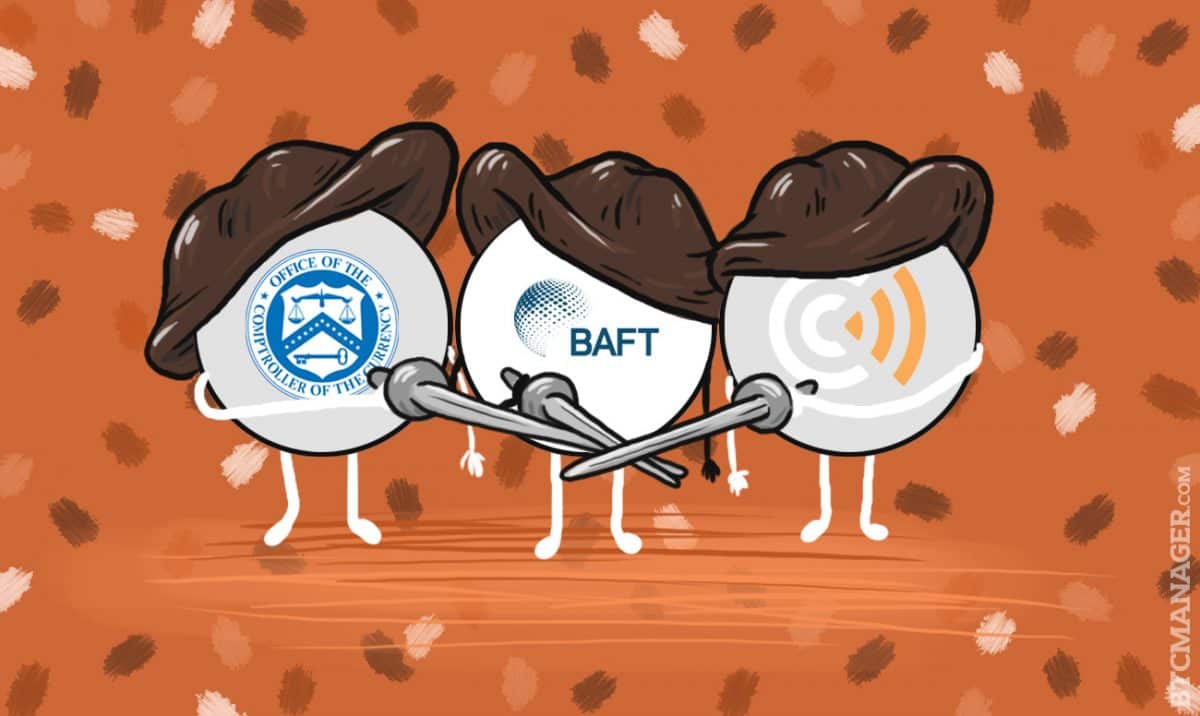BAFT and Coin Center to OCC: “Allow Distributed Ledger Technology to Develop Organically”

On May 31, 2016, Bankers Association for Finance and Trade (BAFT) and non-profit Bitcoin research and advocacy center Coin Center published their official responses to the Office of the Comptroller of the Currency’s (OCC) perspective on supporting responsible innovation and emerging technologies such as distributed ledger technology.
BAFT and Coin Center expressed general optimism for the supportive financial regulations which the OCC proposed and provided some of their own suggestions and proposals which could further benefit the cryptocurrency community and maximize the potential of the distributed ledger technology.
The members of BAFT, an international organization composed of global corporations and banks involved in international transaction banking, have been collaborating with other institutions and companies to embrace distributed ledger technology (DLT) and implement it onto existing financial systems. During the progress, BAFT has come to discover and better understand the potential of DLT and its efficiency in handling international transactions.
The BAFT report acknowledged the way that the “rapid evolution of technology is reshaping commerce,” both in terms of user expectations and in terms of investment.
In response to this evolution, BAFT has been focused on the advent and potential uses of DLT in transaction banking.
Whilst integrating DLT onto their private financial systems, the members of the BAFT realized that DLT must be implemented and grown organically, without the establishment of solid restrictions. The BAFT suggests the OCC and other government agencies that are considering utilizing DLT to improve overall financial infrastructure ought to reduce levels of restriction and develop an open framework in which DLT could work as a decentralized and efficient financial platform.
“BAFT believes that governments should continue to allow DLT to develop organically without imposing burdensome restrictions,” said BAFT. “We urge the U.S. government to craft and adopt a framework for DLT similar to the Framework for Global Electronic Commerce (“the E-Commerce Framework”), which the Clinton administration and republican-led Congress introduced in 1996 to foster innovation around, and investment in, the internet. Under the E-Commerce Framework, the U.S. government and regulators agreed to do no harm to the internet’s continuing evolution.”
BAFT laid out five vital elements to consider when implementing the DLT:
- Private sector should lead
- Governments should avoid undue restrictions
- Where governmental involvement is needed, its aim should be to support and enforce a predictable, minimalist, consistent and simple legal environment.
- Governments should recognize the unique qualities of the technology
- Innovation should be facilitated on a global basis
The BAFT understands that if the DLT or the blockchain technology is implemented into regulated financial frameworks, systems, and protocols, it must be compliant to existing regulations. Therefore, it will be virtually impossible to create a completely open DLT network for banks and other government agencies to use. Recognizing that the OCC and governments are attempting to develop permissioned DLT networks, the BAFT proposes a light regulatory framework and protocol so that a special and unique technology like the DLT can maximize its efficiency.
The BAFT also recommends the OCC to establish a “regulatory sandbox” for entities to test new financial services without being fully compliant to regulations or subject to regulatory consequences for engaging in those activities. The report pointed out that countries like the United Kingdom, Singapore, and Australia have already introduced these sandboxes to foster innovation in their respective financial sectors.
Bitcoin research center and non-profit organization Coin Center also published a response to OCC’s efforts in creating an innovative environment for technologies like Bitcoin and the DLT to grow.
Coin Center began its response by immediately comparing the regulatory ecosystem for fintech and Bitcoin startups in the U.S. and the U.K. Since early 2015, London and other cities in the UK have become known as the startup hub for fintech and blockchain startups that are attempting to test their technologies with leading banks through startup incubators and mentoring organizations.
The team behind Coin Center believes that the U.S. approach to regulating financial technologies, especially burdensome licenses and inefficient regulations, are driving away startups and innovative technologies away from the U.S. Coin Center further emphasized that the efforts of the U.S. government and other agencies like OCC to ameliorate the regulatory environment have not materialized, despite their claims.
“While some U.S. regulators have issued similarly encouraging statements — including the Comptroller of the Currency — little in the way of ameliorative action has materialized. Many in the press have identified the gap and warned of a coming exodus of innovative companies into the U.K. This is a particularly dire state of affairs for American fintech competitiveness given two troublesome structural features of US financial regulation not present in the U.K: federalism, and a rules-based rather than principles-based approach,” said Coin Center.
Another important recommendation provided by the Coin Center team is keeping the software and DLT network open source and open network. A large part of the success of Bitcoin and blockchain technology is its decentralized and transparent nature; that way the entire community can cooperate and collaborate in improving the technology. Coin Center believes the same should be done by governments to increase efficiency.
The U.S. regulatory landscape, however, remains inhospitable to these open innovations because of the issues of federalism and rules-based regulation discussed in the previous sections. The OCC is ideally positioned to change all of that.
Coin Center, BAFT and other organizations are generally positive about the efforts of the OCC. However, they are concerned that most of the plans from the OCC and other government agencies have not been materialized and fintech startups are having difficulty dealing with the current regulatory systems.













